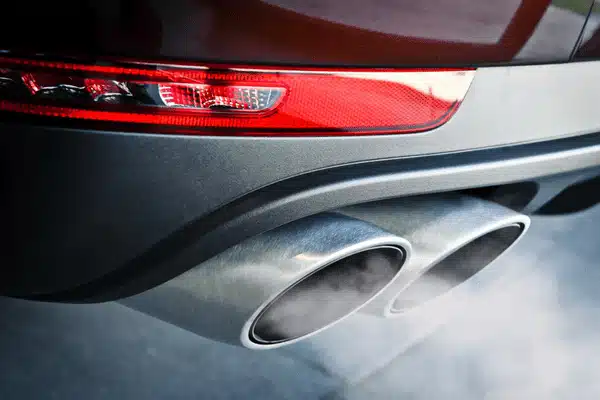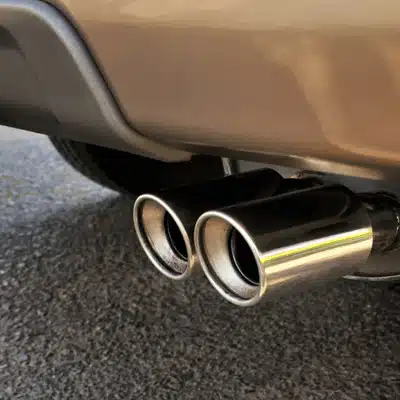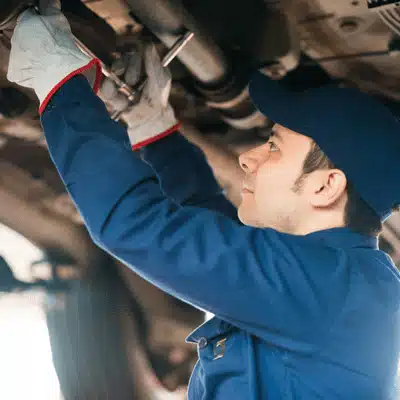Weekdays 8:00am-5:00pm Sat Closed Sun Closed

Your BMW's exhaust system does more than just quiet engine noise. It controls emissions, maintains fuel efficiency, and keeps harmful gases out of your cabin. When exhaust problems strike, they can hurt your car's performance and put your safety at risk.
Road conditions like potholes and salt can damage exhaust parts over time. Normal wear and tear also takes its toll. Recognizing exhaust problems early helps you avoid costly repairs and dangerous situations.
An exhaust leak is the most common issue in aging BMWs. The exhaust pipe can crack from hitting debris or curbs. Gaskets and flange joints between sections fail with age.
Rust accumulation and corrosion speed up the process. Wet climates make things worse. Even small leaks upset your engine's air-fuel mixture. This causes poor combustion and reduced engine performance.
An exhaust leak lets toxic gases escape before reaching your catalytic converter. Your emissions increase and you might fail emissions inspections. Carbon monoxide can seep into your cabin, creating a serious safety hazard.
Fix any exhaust leak right away. Your engine works harder with leaks, and pollution increases.

Your catalytic converter turns harmful exhaust gases into safer substances. It's the heart of your emission control system. Over time, the catalytic converter can clog with carbon or suffer impact damage.
A failing catalytic converter causes sluggish engine performance. You'll notice less power during acceleration or climbing hills. Fuel efficiency drops too. The check engine light often comes on when the converter isn't working right.
Listen for rattling under your car. This happens when the internal ceramic breaks apart. Back pressure from clogs can lead to engine overheating or engine misfires.
Replace a failed converter quickly. It prevents engine damage from excessive heat and pressure.
BMW models have multiple oxygen sensor units in the exhaust stream. These sensors monitor oxygen levels and help adjust fuel mixture. When an oxygen sensor fails, your engine runs too rich or too lean.
Bad sensors cause poor fuel consumption and higher emissions. They're a common cause of check engine light warnings. You might notice rough idling or subtle power surges.
Replacing faulty sensors usually fixes the problem fast. Fresh sensors improve fuel efficiency and protect your converter from early failure.
Your muffler dampens exhaust noise while the resonator cancels certain sound frequencies. Both components can rust from moisture and corrosive byproducts.
When your muffler is damaged, you'll hear loud roaring or harsh buzzing sounds. You might smell exhaust fumes more strongly if holes develop. A collapsed part can restrict flow and reduce vehicle performance.
Extreme blockages can make your engine struggle to run. Replace failing parts to restore proper flow and quiet noise levels.
The exhaust manifold collects gases from engine cylinders. It endures extreme heat and can crack over time. Cracks create immediate leaks at the engine.
Listen for sharp ticking or hissing sounds after startup. As metal expands, the sound may fade. Leaks throw off sensor readings and cause engine performance issues.
You might smell burning if hot gases scorch nearby parts. The exhaust manifold leak can damage wiring and reduce low-end power. Fix cracks quickly to restore proper gas flow.
Rubber and metal hangers suspend your exhaust under the car. They isolate vibration and hold pipes in place. Heat and age cause rubber hangers to crack and break.
Failed hangers let the exhaust hang low or shift position. You'll hear clunking or rattling over bumps. Loose parts can cause cabin vibration.
Without proper support, added stress can crack the exhaust pipe or loosen joints. This creates leaks that hurt performance. One broken hanger can cause serious damage. Replace hangers quickly - new ones cost little but prevent big problems.

Metal exhaust heat shield parts protect other car components from intense heat. These thin shields can corrode or come loose over time.
Failing exhaust heat shield components make rapid rattling sounds like tin cans. The noise often happens at idle or startup. While loose shields don't affect performance directly, they shouldn't be ignored.
Missing shields leave fuel lines, wiring, and floors exposed to extreme heat. This creates fire risk in severe cases. Corrosion weakens fasteners while impacts knock them loose.
Fix rattling shields quickly. It's usually simple work.
Rust destroys your exhaust system over time. Moisture from condensation and weather causes corrosion on pipes and parts. Salt speeds up rusting in winter climates.
Eventually rust eats through metal, creating holes or breaking sections. It makes seals fail when surfaces no longer match properly. You might see visible rust flakes or holes.
Keep your car's underside clean and inspect regularly. Catch rust early to prevent minor problems from becoming major failures.
Watch for these exhaust symptoms:
Loud exhaust noise or rattling means leaks or holes in components. Hissing sounds point to cracks. Rattling could be loose parts or broken shields.
Reduced power and acceleration happens when clogs restrict flow. Your BMW feels sluggish because the engine can't exhale freely. Pressure builds up and hurts engine performance.
Poor mileage results from upset fuel mixtures. Problems before sensors confuse engine computers. Fix underlying exhaust system issues to restore your gas mileage.
Warning lights often signal exhaust-related faults. Failing converters and bad sensors trigger codes. Don't ignore lights - have codes read and problems diagnosed.
Unusual smell is a major red flag. Fumes in the cabin indicate dangerous problems. Sulfur smell points to converter trouble. Burning smell means hot gases are heating nearby parts.
Visible exhaust smoke tells you about engine health. Blue exhaust color means oil burning. Black exhaust color indicates rich fuel mixtures.
Excessive vibration or hanging components need immediate attention. Broken mounts cause parts to shake and knock. Don't drive with hanging parts - they can fall off or cause more damage.
Carbon monoxide leaks can be deadly. Even small exhaust leaks risk poisoning without warning signs.
Small problems become expensive repairs. Fix a sensor now or rebuild an engine later.
Working systems restore lost power and improve fuel efficiency. Your BMW drives like it should.
Failed converters mean automatic test failure. Keep your exhaust healthy to avoid hassles.
Exhaust problems aren't just annoying - they're dangerous. Gas leaks can be deadly if fumes enter your cabin. Even small problems risk poisoning without warning signs.
Loose parts or missing shields create fire hazards. Hot gases can ignite fuel or flammable materials. Fix problems and secure loose components immediately.
Small troubles become expensive repairs when ignored. Clogged converters make engines work harder and run hotter. This can burn valves or cause overheating.
Fix root causes early to protect your investment. It's cheaper to replace a sensor now than rebuild an engine later.
Working systems restore lost power and throttle response. They improve consumption and eliminate annoying sounds. Your BMW drives like it should when everything works right.
Most areas require testing for registration. Failed converters or active warning lights mean automatic test failure. Keep your exhaust healthy to avoid hassles and re-tests.
Don't attempt DIY repairs. These jobs require special tools, welding equipment, and gear. Components are often rusted and difficult to remove.
Professional mechanics have proper lifts and experience with hot, dangerous parts. A qualified car repair garage can diagnose problems correctly and fix them completely.
Quality repair services will replace related seals and supports as needed. You'll get lasting fixes instead of temporary patches. This maintenance approach ensures your tailpipe and entire system work properly.
Professional vehicle service is especially important for European cars that need specialized knowledge.

BMW exhaust system issues range from simple hanger failures to complex converter problems. Each creates distinct exhaust symptoms that warn of trouble ahead. Loud sounds, poor engine performance, unusual smells, and warning lights all signal needed work.
Don't wait when exhaust problems appear. Quick action prevents costly damage and dangerous gas situations. Professional help ensures safe, complete fixes that restore your BMW's power and efficiency.
Your system affects everything from performance to cabin air quality. Keep it working properly through regular care and prompt repairs. Check your tailpipe area regularly for signs of trouble.
When you notice rattling sounds, reduced power, or unusual smells, contact a qualified technician right away. Your tailpipe condition often reveals broader system health.
Remember that exhaust problems can quickly turn from minor annoyances into major safety hazards. Your tailpipe and connected components work together to protect both engine performance and passenger well-being.
Schedule your BMW exhaust inspection today. Don't let small problems become major headaches - contact us today.
Check your exhaust every 6 months or during oil changes. Look for visible rust, hanging parts, or damage under the car. Listen for unusual sounds during startup and driving.
No, even small leaks can let dangerous gases enter your cabin. They also upset fuel mixtures and increase pollution. Get any leak fixed immediately for your protection and engine health.
Engine troubles, bad sensors, and oil consumption damage converters quickly. Rich fuel mixtures from faulty sensors overheat the unit. Keep your engine tuned properly to protect this expensive component.
Simple fixes like supports cost under $100, while component replacement runs $200-500. Converter replacement can cost $1000-2500 depending on your model. Early repair prevents more expensive problems later.


